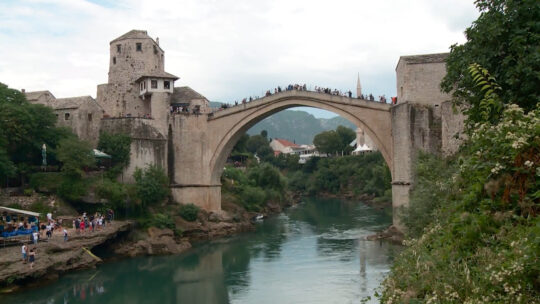
According to the BiH Constitution, Jews are a minority in the country. Prior to 1941 they were numerous, 28 percent of the Sarajevo population alone were Jews but after the holocaust, persecutions and the last war in Bosnia, the Jewish community has been decimated in a way, the Head of the Jewish Municipality in Sarajevo Boris Kozemjakin told N1, adding that today only 700 Jews remain in Bosnia, 500 of whom are in Sarajevo.
“There used to be 26 Jewish Municipalities in Bosnia, Now there are only six,” Kozemjakin said. “We don’t see ourselves as a national minority but more of an autochthonous people of Bosnia and Herzegovina. Of course, due to our low number, we’re not a constituent people, whatever that means, but in any case, we’re autochthonous, a people that belong to this region who came here and became part of the region. We’ve been present here for over 500 years. When we were expelled from Spain, the Sephardic Jews at the beginning of the 16th century, we came here, to Bosnia, to the then Ottoman Empire. The entire Islamic population was expelled from Spain as well at that time so we both came to the Ottoman Empire.
Kozemjakin and other Jews have no doubts as to what their homeland is.
“Despite sounding immodest, I think Jews love Bosnia and Herzegovina the most. I'll tell you why. We derive and consume our suffrage, no matter how limited, only in Bosnia and Herzegovina. Nowhere else do we want, can, wish to vote nor does anyone need us anywhere. However, all these others have in some way, second homelands and they can vote within their second homelands, as well as within Bosnia. We have no alternative, we are simply here, we want to stay here, we want to exist and share the destiny of all peoples in this area,” Kozemjakin said in an interview with N1.
Although Bosnian Jews had an offer to move to Israel during the 1992-1995 war in Bosnia, the Jewish community decided that given that they are people of this area, to whom this is a natural environment and how they once left their homes between 1941 and 1945, they no longer wanted to move, except to evacuate their children and elderly.
Today, in relation to the percentage of the people who returned to their homeland, Jews make up the largest percentage, 45 percent of Jews returned to BiH, to Sarajevo.
The connection with the Jews in Israel is based only on their family relationships, because many have members of the immediate and extended family, who live in Israel – Kozemjakin explained.
“I can understand some Serbs, Croats who have their family ties either in Serbia or in Croatia – but their ties are politically deepened, they are different, but we have no, absolutely no political ties with Israel, we have no Israeli citizenship, we have nothing, as Serbs and Croats have certain benefits within these ‘homelands’ as they call them. For us, Israel is not our homeland, for us, Bosnia and Herzegovina is the only country,” he noted.
The Jews in Bosnia are distanced from the events that the whole world is talking about, the current events in the Middle East, in which Israel and Palestine are the main actors, and which are reflected on our country, especially its division.
“We are absolutely at a distance, we don’t want to declare ourselves on that part at all, because we are organized in a religious community. As such, religious communities, according to the Constitution and the Law on Freedom of Religion and the Legal Status of Churches and Religious Communities, are separated from the state and have neither the right nor the opportunity to express any position in relation to official Bosnian politics. The Jewish community, as a religious community, and I hope other religious communities too, shouldn’t and mustn’t have any political position in relation to conflicts or in relation to any political relations that states have,” said Boris Kozemjakin, the Head of the Jewish Municipality in Sarajevo and member of the Executive Board of the Interreligious Council of BiH in an interview with N1.





Kakvo je tvoje mišljenje o ovome?
Budi prvi koji će ostaviti komentar!